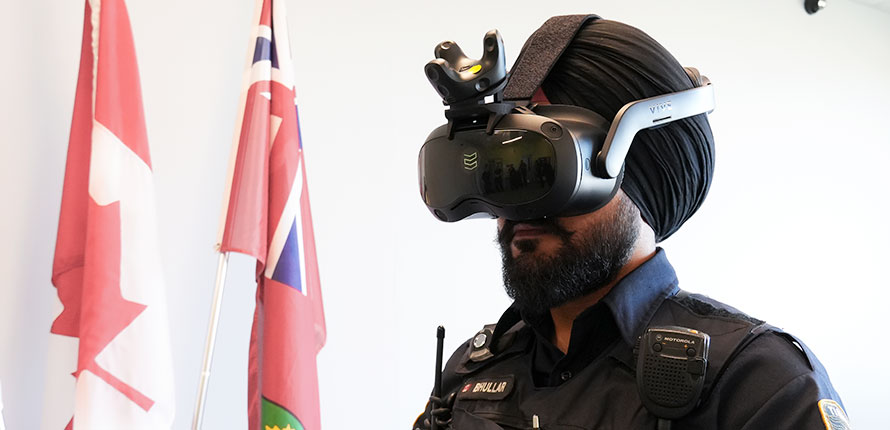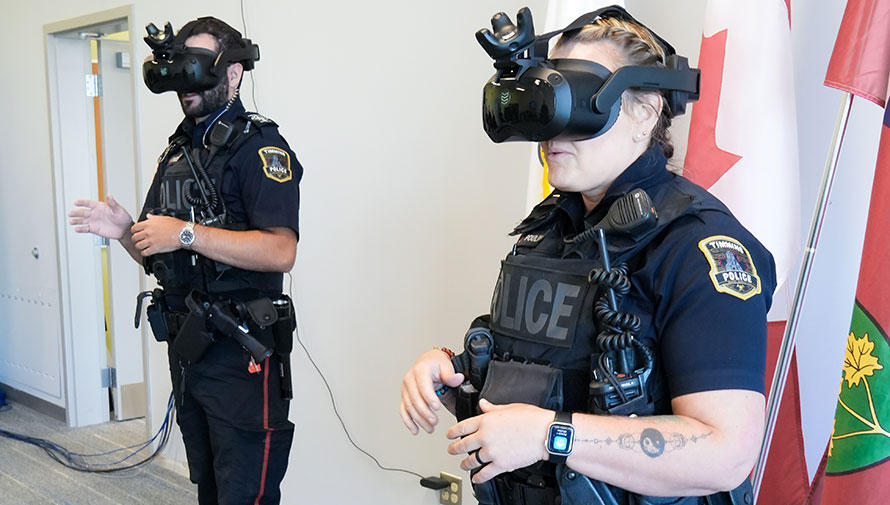We use cookies on this site to enhance your experience.
By selecting “Accept” and continuing to use this website, you consent to the use of cookies.
Search for academic programs, residence, tours and events and more.
Sept. 18, 2025
For Immediate Release
BRANTFORD — All sworn police officers in Ontario are now required to complete mental health crisis training through a curriculum developed by Wilfrid Laurier University researcher Jennifer Lavoie, associate professor of Psychology and Criminology. The Mental Health Crisis Response (MHCR) Education and Applied Training Program will help police officers identify mental health crises, respond skillfully and compassionately, and improve de-escalation practices to reduce reliance on the use of force.
MHCR includes online modules and scenario-based training using live actors or virtual reality (VR). Ontario is only the second province to have a de-escalation standard, following British Columbia. MHCR is offered through Laurier’s Centre for Public Safety and Well-Being, complementing additional university offerings designed for police learners.
“The MHCR program marks a transformative shift in how police officers are trained to support individuals experiencing a mental health crisis,” said the Honourable Michael Kerzner, Solicitor General of Ontario. “As a first-of-its-kind initiative, it highlights the essential role of collaboration between policing and academia. These partnerships are vital to advancing evidence-informed, community-responsive training, and the leadership of our policing and university partners has been key to its success. For our government, protecting Ontario means everything, and that includes ensuring our frontline officers are equipped to respond with compassion and care.”
The province-wide training mandate – now part of the Community Safety and Policing Act (CSPA), 2019 – marks the culmination of eight years of research, design and validation by Lavoie, in collaboration with Natalie Alvarez (Toronto Metropolitan University), Yasmine Kandil (University of Victoria) and Lisa Whittingham (Brock University).
“The Mental Health Crisis Response Education and Applied Training Program uses scenarios that are realistic and emotionally charged to help officers refine their de-escalation skills, build confidence, and respond with empathy and professionalism in the field,” said Lavoie.

Mental health and substance use-related calls are among the fastest-growing demands on police services, yet most officers receive limited training to prepare them to respond. MHCR was developed, in part, as a direct response to Justice Frank Iacobucci’s 2014 report investigating police encounters with people in crisis and Ontario Ombudsman Paul Dubé’s 2016 report “A Matter of Life and Death.” Both reports called for improved police training and accountability in de-escalating situations involving people in mental health crisis. MHCR answers that call, providing officers with the tools and strategies necessary to reduce the use of police force and associated harms, and assist in boosting public trust and satisfaction with police services.
“The public asked for safer, more compassionate crisis response that supports the work already being done by police and we are proud to support police services to undertake this transformation through collaborative, evidence-based education and training,” said Whittingham, MHCR co-lead and an assistant professor at Brock University.
MHCR is grounded in the award-winning De-Escalating Persons in Crisis Tool (DePICT™), which assesses police de-escalation knowledge, skills and abilities during mental health-related crisis calls. Co-designed by clinicians, cultural safety experts, police trainers and people with lived experience of mental illness, Lavoie says their collective goal is to foster a “relational policing approach, one that is rooted in humanization, dignity, respect and fairness.”

Officers from the Timmins Police Service participate in Laurier's Mental Health Crisis Response Education and Applied Training Program.
The MHCR curriculum includes interactive online modules that provide foundational knowledge, followed by scenario-based training to rehearse peaceful de-escalation strategies. A standout feature is its use of immersive VR technology to simulate high-stakes crisis scenarios in a safe, controlled environment. These cutting-edge simulations – also available through live actor-based role play – provide officers with hands-on experience navigating complex mental health interactions before they occur in real life.
To sustain impact, officers must complete annual requalification. Police services can either train certified MHCR instructors through Laurier’s Train-the-Trainer (T3) program or request direct delivery via Laurier facilitators.
“This is a vital part of the continuous evolution in policing,” said Sgt. Daniel Vincelette with the Ottawa Police Service, one of the first T3 trainees. “Drs. Lavoie and Whittingham not only have the authority and credibility to instruct the subject, but also a contagious passion for it. Learning from them was a great experience and I believe this program has the potential to make a real difference in frontline policing across Ontario.”
MHCR training is underway at dozens of police services across Ontario, including Hamilton, Timmins, York, Peel, Ottawa, Kingston, Durham, Niagara, London and Windsor.
“MHCR is an excellent example of evidence-based, community-informed policing making a real difference for our officers and communities,” said Paul Pedersen, executive director of the Ontario Association of Chiefs of Police (OACP). “OACP is proud to have supported the development and implementation of this vital training, which equips police professionals across Ontario with the skills they need to respond to mental health crises with empathy, professionalism and care. This initiative represents a major step forward in advancing both public safety and community trust.”
– 30 –
Media Contacts:
Beth Gurney, Director: Strategic Communications and Community Engagement
Wilfrid Laurier University, Brantford campus